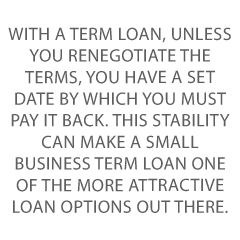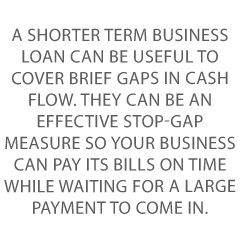Term loans are usually the first option we think of when we consider business financing for small businesses. But what are they really about? Is a small business term loan the best choice for a small business? And can your business even qualify for them in the first place?
What Is a Term Loan & How Does It Work?
A term loan is generally a bank loan with specified repayment terms. It can have either a fixed or a floating interest rate. It can be a small business loan or a personal loan. It can also come from a credit union or an online lender.
These can be emergency short-term loans, or they could be long-term loan. If the repayment term s are short, then the interest rate will be a lot higher.
s are short, then the interest rate will be a lot higher.
With a term loan, unless you renegotiate the terms, you have a set date by which you must pay it back. This stability can make a small business term loan one of the more attractive loan options out there.
In general (at least for longer terms), the interest rates will be lower and the monthly payment is lower. With a short-term loan program, a borrower may have to make a balloon payment.
These kinds of loans are available via commercial banking, but there are personal versions of term loans.
Some of the better known are payday loans and the kind of student loan you can get as a part of an overall student financial aid package, paid via direct deposit into student accounts. Another well-known sort of term loan is a mortgage.
In the business world, the SBA loan is another kind of business term loan. The Small Business Administration offers several types of business loans, and they are virtually all term loans.
With all these loans, the borrower gets a lump sum of money upfront.
Types of Term Loans
There are three types of term loans. Rather unimaginatively, they are called short-term loans, intermediate-term loans, and long-term loans.
Shorter-term loans are usually offered to firms that do not qualify for a line of credit. They generally run less than a year, though this expression can also refer to a loan of up to 18 months.
Payday loans are a form of shorter-term loans, often for a smaller loan amount from the loan fund.
Intermediate-term loans tend to have a loan term of one to three years. They are paid in monthly installments from the company cash flow.
Intermediate-term loans are often repaid straight from the asset they paid for. For E.g. an intermediate loan to buy a piece of equipment might be paid back via increased revenue the new equipment brings in.
A longer-term business loan will last three to 25 years. They use company assets as collateral, calling for monthly or quarterly payments from profits or cash flow.
Longer-term loans can limit other financial commitments the company may take on, like other debts, dividends, or principals’ salaries. They can even require an amount of profit set aside specifically for loan repayment.
Both shorter and intermediate-term loans may also be balloon loans and come with balloon payments. What this means is the final installment swells or balloons into a much larger amount than any of the prior ones.
The principal of a term loan is not technically due until maturity. However, most term loans will operate on a specified schedule requiring a definitive payment size at certain intervals.
Most mortgages are a good example of longer-term loans.
What is Term Loan Example?
One example of a term loan is an SBA 7(a) loan. A small business can use it for a variety of purposes (although the SBA does have some restrictions on using a 7(a) loan to refinance preexisting business debt).
Acceptable uses include purchasing equipment or supplies; buying real estate or buildings; operating, starting, or expanding a business; and the construction or renovation of buildings.
The SBA requires documentation such as your business license, your income tax returns (personal and business), and business financials.
Repayment terms will vary depending on the lender. However, these loans are nearly always paid back with monthly payments of principal and interest. These payments will stay the same for fixed-rate loans because the interest rate is constant.
But for variable-rate loans, the lender can require a different payment amount when the interest rate changes.
Terms tend to be up to 10 years for working capital and 25 years for buying real estate.
A lender may set up an SBA loan with interest-only payments during a company’s startup or expansion phase. As a result, the business will have some time to generate income before making full loan payments. Note: most SBA loans do not allow balloon payments.
Pros of Term Loans
Interest rates tend to be good—at least when you’re looking at longer terms. For longer terms, you will generally need to have a good credit score.
Having a longer-term loan on your business credit report can signal to other lenders and credit providers that you have good credit. As a result, other good credit business loans and business credit cards should start to open up to you.
Longer-term loans also have the advantage of being several opportunities for you to continue to grow and improve your business credit score.
It is also pos sible to negotiate longer-term loans. A business owner will be in the best position to do so if they have a good earnings history—the longer, the better. However, a business with highly leveraged debt will not be in a good position to negotiate.
sible to negotiate longer-term loans. A business owner will be in the best position to do so if they have a good earnings history—the longer, the better. However, a business with highly leveraged debt will not be in a good position to negotiate.
A shorter-term business loan can be useful to cover brief gaps in cash flow. They can be an effective stop-gap measure so your business can pay its bills on time while waiting for a large payment to come in.
Another advantage of shorter-term loans is that you can often get the money you need into your account quickly, via direct deposit.
Cons of Term Loans
Getting short-term loan funds comes at a price. The interest rate will be high, and it will often be very short-term. As in only a few days. Can you pay it all back in a week? Or will you have to borrow again, and perpetuate the cycle of debt?
Business owners should read any short-term loan application carefully so they know exactly what you are getting themselves into. Is getting money quickly worth it?
There are other options that may work better for you than term loans for shorter terms, such as cash flow financing and merchant cash advances. Equipment financing for the purchase of fixed assets can also be a better choice.
It’s painfully easy to default on a payday loan. In turn, that makes it easy for you to tank your personal credit score, and perhaps your small business credit as well. And if you have secured a loan with personal property, it will be seized by the creditor.
Consistent shortfalls and cash gaps can be a symptom of poor handling of business financing. An emergency is one thing. But no business should be operating in an atmosphere of perpetual emergencies.
How To Apply For A Term Loan
You will have to have a certain minimum time in business. And you will need to prove a minimum cash flow amount. Plus you will have to show you have good personal credit. That’s often in the mid-600s or higher.
There will be an application that you will need to fill out. These days, you can often do that online, even if your lender is a brick-and-mortar establishment.
Applications usually call for how much you think you will need and what you are going to do with the funds if you are approved. You often don’t have to provide a promissory note, like you would if borrowing from an individual.
Documents you need to provide will include:
- Your business’s EIN
- The company’s business plan
- Your small business and personal bank account statements
- Personal tax returns and business tax returns
- Proof of business registration and licenses (if applicable)
- Profit and loss statements, cash flow, and balance sheet
- Proof of collateral (value and ownership, if required
- A listing of your business assets and liabilities
Most times, the lender will have an account manager get in touch with you.
Working with an account manager gets you better customer service. Also, they can answer your questions as they arise. And, they will likely be the person (or among the persons) who decides whether you get a loan at all.
There will be at least a soft pull on your credit. And, at times, there can be application fees. Some term loans will require collateral.
Shorter-term loans may even provide funding on the same day.
Is Getting a Term Loan a Good Idea?
It can be. For businesses that qualify for longer-term loans, the upsides include more time to pay, often interest rates at a fixed rate, and a set repayment schedule they can budget and plan for.
Also, approval for one longer-term loan can serve as a signal to other lenders that your credit is good and you pay your bills on time. Along with credit scoring, this can help you get a business credit card, other loans, and other kinds of business funding.
Small business owners should keep in mind that a longer-term loan ties up a percentage of their profits for a significant period of time—and sometimes a lender will charge a prepayment penalty if you try to pay off your loan early.
Entrepreneurs with good FICO scores and provable cash flow and revenue should seriously consider longer-term loans. This is especially the case if they have most of the necessary documents already, and those documents were professionally prepared.
Small businesses which only need a shorter-term loan to cover a financial shortfall should compare those term loans with financing options such as merchant cash advances, cashflow financing, and purchase order financing.
In addition, small businesses which are continually borrowing in the short term in order to cover cash shortfalls should reexamine how they budget. They may need to reconsider their immediate plans for growth.
And small businesses which continually lurch from crisis to crisis may also do well to have their books independently audited, to make sure they are not wasting money they could easily be saving.

